Former CIA Director Michael Hayden told Meet the Press’ David Gregory on Sunday morning that security and transparency were a zero-sum game.
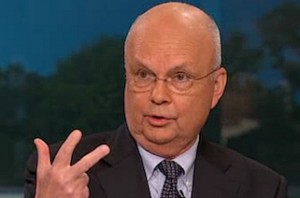
“For part of my life, when I was running the NSA program, I thought lawful, effective, and appropriate were enough,” Hayden said. “By the time I got to CIA I discovered I had a fourth requirement, and that’s politically sustainable. By the time I got to the CIA I was of the belief that I would probably have to shave points off of operational effectiveness to inform enough people that we had the political sustainability and the comfort of the American population concerning what it was we were doing. Living in this kind of democracy, we’re going to have to be a little less effective in order to be a little more transparent to get to do anything to defend the American people.”
Hayden’s comments came in response to journalist Jim Risen’s critiques of lack of transparency in the intelligence community, to the point that low-ranking intelligence officials had little recourse when they spotted something amiss.
“The internal system for whistleblowing is broken,” Risen said. “There is no good way for anyone inside the government to go through the chain of command and report about something like this. They all fear retaliation, they fear prosecution. Most whistleblowers, the only way they have is to go to the press.”
Andrea Mitchell argued that whistleblowers like Snowden could to the intelligence committees in Congress if they had something to report.
“If you’re a low-ranking person in the intelligence community,” Risen responded, “and you go to the Congress, the Senate or the House, you will be going outside the normal bounds. Going to Congress would be an unauthorized disclosure.”
Watch the exchange here, via NBC News
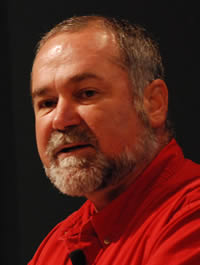
ROBERT STEELE: I am satisfied that Ed Snowden was made an offer by the Chinese he could not refuse, and that the Chinese have executed a perfect covert action that not only incapacitated President Obama during his entire meeting with Premier Xi, but brought a firestorm of public attention to the unconstitutional and highly questionable practices of the National Security Agency (NSA) and its corporate collaborators. Mike Hayden means well, but he is totally out of touch with ethics, the point of intelligence, and reality. Sadly, his views are representative of the other seniors, notably Jim Clapper and Keith Alexander. They have never learned how to produce intelligence (decision-support) — they only know how to move money, and badly at that. They are not held accountable for outputs, and one reason that whistleblowers have such a hard time going to Congress, is that the Congress is corrupt, every member of the oversight committees is getting a 5% kick-back on all secret programs regardless of whether or not they are effective. There is no constituency in Washington for intelligence (decision-support) with integrity — for ethical evidence-based decision-support not just for the President but for every Cabinet officer, every bureau and division chief, every desk and action officer.
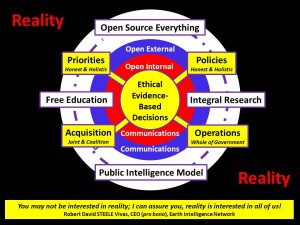
The secret world seniors (asnd most of their counterparts across the USG) are lazy — morally lazy and intellectually lazy. I am not holding my breath in anticipation, but if President Obama wants to survive his last three years in office with a modicum of respectability, he could start by sponsoring the Electoral Reform Act, establishing the Open Source Agency, and making the five Supreme Court justices that voted for corporations in CITIZENS UNITED a retirement offer they cannot refuse. While I am very optimistic about the future — all of these people will die eventually, and be replaced by a new generation of seniors that understands Present Shock, I grieve to think of the cost to the USA of ignoring intelligence reform calls — in writing, always approved by the CIA and DoD pre-publication review process. We have wasted 20 years and $1.2 trillion dollars creating the world's most expensive and most ineffective technical collection systems, while neglecting processing, human collection, open source collection, and all-source analysis — and of course refusing to consider any possible multinational information-sharing and sense-making coalition that is rooted in ethical legal collection that has the double advantage of benefiting from all experts outside the secret world, and being shareable with Congress, the media, and the public. The secret intelligence world — good people trapped in a bad system for whom Mike Hayden is a spokesperson of sorts — is, in one word, retarded.
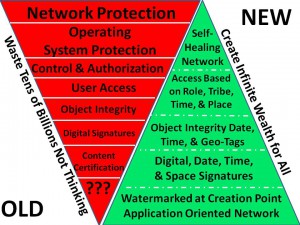
It is also now in clear violation of the Constitution across multiple fronts, and all of its intelligence leaders are subject to international tribunal claims in relation to rendition, torture, and drone assassinations that have been, at best, 2% effective — the other 98% are documented innocents. This is insane. Criminally insane. We have wasted 20 years and $1.2 trillion dollars since I first published my call for six fundamental changes in how we do intelligence. Colin Gray in Modern Strategy articulates most ably that time is a strategic variable that can neither be bought nor replaced. Security comes from legitimacy, and legitmacy comes from transparency, shared truths, and the trust that results. Before the Nobel Prize was devalued, an economist was recognized for demonstrating that trust lowers the cost of doing business. The views of the senior political and appointed officers in the US Government who believe that security can only be achieved by refusing transparency, are ignorant, arrogant, and grounds for impeachment or retirement. Every single one of them is an abject failure, well-intentioned no doubt, but in complete betrayal of the public trust with every breath. Those who wish to understand modern information security will be well-served by studying two of the masters who have most influenced my grasp of the nuances, Winn Schwartau (time and risk-based security) and Robert Garigue (distributed security, trust rather than control as the deliverable). I honor Robert in particular with a graphic that represents the vision he and I shared before he died in his sleep at the age of 51. I miss him, as I miss Winston Maike and so many other pioneers whose governments refused to embrace intelligence with integrity when they had their first chance to do so. Open Source Everything (OSE) is the technical solution for the future — it is affordable, inter-operable, and infinitely scalable. M4IS2 is the human solution — Multinational, Multiagency, Multidisciplinary, Multidomain Information-Sharing and Sense-Making. Network-Enabled Capability is about trust, not control. No one now serving is capable of leading the US secret world in the direction it needs to go if it is to be relevant and useful to the public interest in the 21st Century. IMHO.

See Also:
1990 Intelligence in the 1990′s – Six Challenges
1992 E3i: Ethics, Ecology, Evolution, & intelligence (Full Text Online for Google Translate)
2008 Open Source Intelligence (Strategic) 2.0
2008 Rebalancing the Instruments of National Power (Full Text Online for Google Translate)
2008 The Substance of Governance
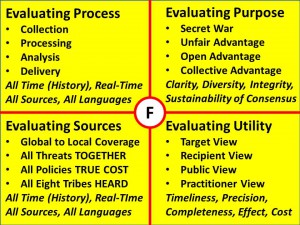
INTERVIEW: Open Everything – with Robert David STEELE Vivas UPDATED to Add Parts V and VI
NATO OSINT to OSE/M4IS2 Round-Up
Review: The Search for Security–A U.S. Grand Strategy for the Twenty-First Century
Xi to Obama: This Is Me Being Inscrutable — LOL! + Snowden RECAP + US Cyber-Idiocy RECAP



